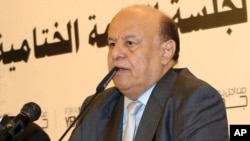Yemen's ousted president on Saturday rejected the Shi'ite rebel takeover of his country's capital and government, in a statement read on television channel al-Jazeera after he left the capital, Sana'a.
Abed Rabbo Mansour Hadi issued the statement under the title of president, in an apparent retraction of his resignation last month after the Houthi rebels seized the presidential palace.
Hadi declared all steps taken by the Houthis "illegitimate" and called on them to release top officials in his government from house arrest. He had been under house arrest himself before fleeing Saturday to his hometown of Aden in the country's south, but there were conflicting reports as to whether he escaped or the Houthis let him go.
The U.N. Security Council adopted a resolution earlier this week demanding that the Houthis restore the Sana'a government and release Hadi, who is backed by the United States.
Hadi called on the international community Saturday to "reject the coup" and called for a meeting of the country's political factions under the so-called "national dialogue." He said the meeting could be held in either Aden or Taiz, cities not under Houthi control.
Yemen has been mired in political turmoil since the rebels seized Sana'a in September.
On Friday, the U.N. envoy to Yemen said rival political parties, including the Houthis, were getting closer to reaching a deal that could prevent the country from sliding into civil war.
"We took a very important step this morning toward reaching a political deal to end the current crisis," Jamal Benomar said in a statement posted to his Facebook page.
"Parties to the talks have agreed on an interim legislative body that guarantees the participation of all political elements not represented in the current lower house of parliament," he said. "According to the deal, the lower house will retain its current form, and a congress called the People’s Transitional Congress will be formed."
Mohammed Albasha, a spokesman for the Yemeni Embassy in the United States, told VOA after the announcement that the agreement to replace the current upper house of lawmakers with the new transitional council was a positive step.
Benomar said issues that remained unresolved included the status of the presidency.
Since seizing power in January, rebels have dissolved parliament and set up their own ruling body. They say they are carrying out a "revolution" against corrupt officials and economic ruin.





